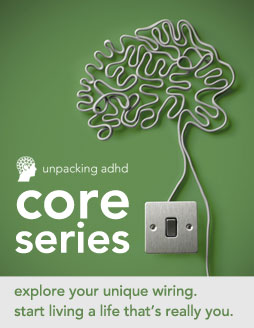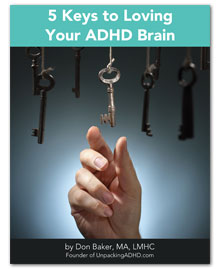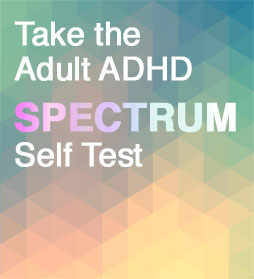We made a video about a year ago. It’s not super-slick, but I still think it captures the essence of what Unpacking ADHD is all about. So, if you haven’t watched it, I hope you’ll do so now. Or read the original script below.
(If you’ve been wondering why the first class of the Unpacking ADHD Core Series is called Opening the Suitcase, here’s your answer!)
ADHD is real. It is a proven neurobiological syndrome that can cause distractability, restlessness, and impulsivity. My name is Don Baker and like ten million other adults, I live with the traits of ADHD. I’m also a licensed mental health counselor who has dedicated my life to helping others who are “differently wired.”
Everybody has a unique mix of traits, but in my experience adults with ADHD all share at least one thing in common: they feel different. Often they swing wildly between the sneaking suspicion that there’s something special, even brilliant, about them — and the crushing weight of feeling like they just can’t cope with life as well as other people seem to. This secret, confusing difference is like an invisible suitcase, and many people wish they could just put it down.
The thing you may not realize is that ADHD is not a disease. It’s a difference. And it comes with both challenges and gifts. The people I work with struggle with things like organization, time management, and moderating their emotions, but they’re also some of the smartest, most creative, intuitive and interesting people around.
Let me tell you about a few people I’ve worked with over the past 15 years
…A talented executive at an international non-profit organization who manages to hide her symptoms from everyone else, but struggles with depression because she feels so isolated.
…A passionate entrepreneur who constantly comes up with great ideas, but has difficulty following through on all the opportunities he creates.
…An engineer who works wonders in his field at top companies, but has trouble keeping a job because he has outbursts when he gets overwhelmed.
In terms of ADHD treatment, these are the people who fall through the cracks. Their difficulties weren’t recognized during childhood, so they learned to compensate. They put tremendous amounts of energy into hiding their challenges. But they are at incredible risk for depression, addiction, health problems, and many other difficulties. They need help and support to come to terms with their unique brain wiring.
If any of this sounds like you, I want you to know that there is hope. A lot of hope. A great big sparkling, radiating light that’s not just at the end of the tunnel, but also inside your own mind.
Because when you really start unpacking ADHD — taking the time to look at what it means for you, to understand your brain chemistry, to identify your triggers, to figure out what strategies and solutions work the best — you’ll be amazed at how much your quality of life can improve.
You’ll see that many of your challenges are also strengths, if you reframe your perspective.
You’ll let go of shame as you meet others on this journey who you can respect and admire.
And most of all, you’ll start to believe in yourself and your ability to accomplish your goals. You’ll open that invisible suitcase wide and toss out all the negative messages you’ve internalized — and you’ll repack it with a clear sense of who you are and what you need to thrive.
Every journey begins with a single step. You know this. I encourage you to join us and come back different.
Learn more about the Unpacking ADHD Core Series.
UPDATE 8/4/15 – Don’t miss the flash sale! Sign up for the first 4-week online course, Opening the Suitcase, by midnight Wednesday and pay just $30 (a $15 savings)! SIGN UP NOW




